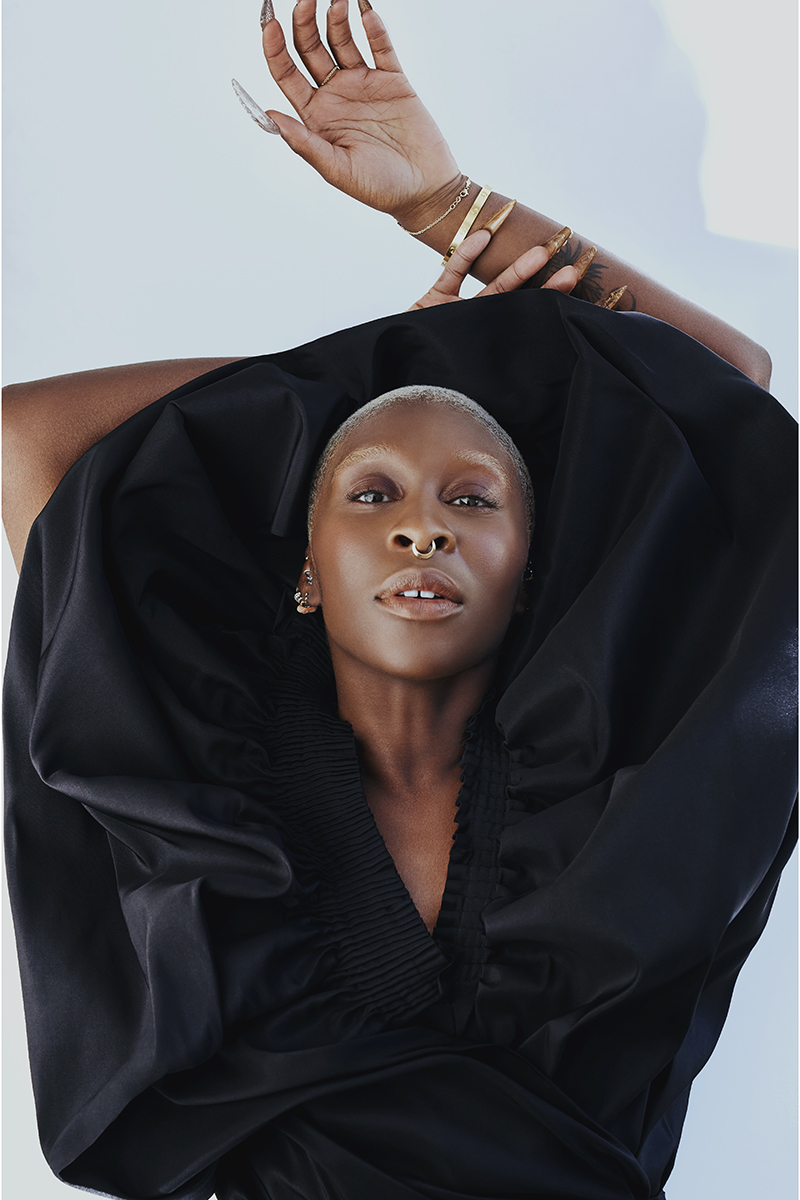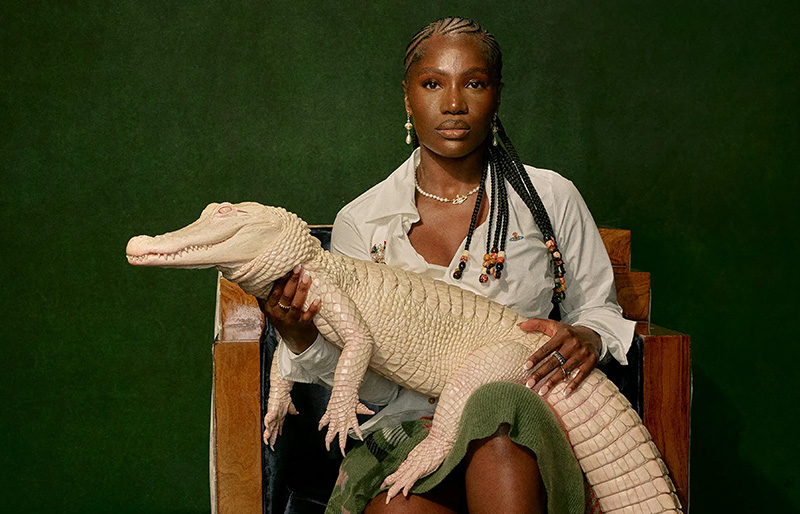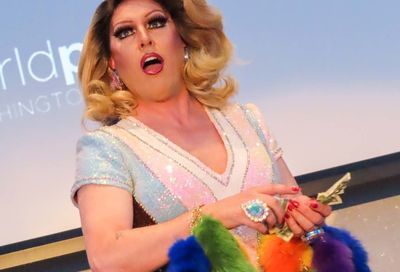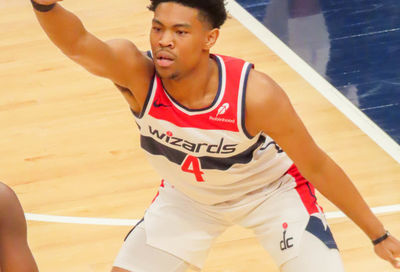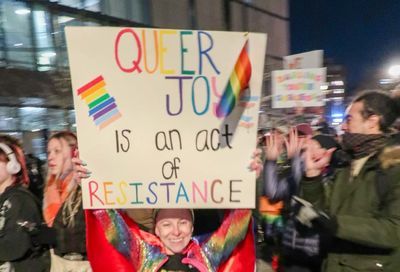Chair Apparent
Linda Cropp's mayoral quest
The second in an occasional series of interviews and stories on the 2006 D.C. mayoral and Council races.
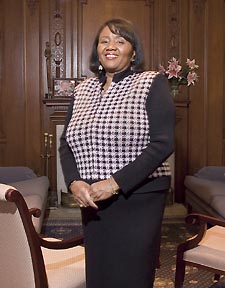 Linda Cropp |
It’s definitely election season when the candidates come courting the GLBT community. And last week at Titan, much of that community seemed ready to go as they packed the bar to meet D.C. City Council Chairman Linda Cropp. Surrounded by the movers and shakers of the community, her staff found it difficult to move the popular politician on to the next campaign event.
“They had to drag me out of there,” laughs Cropp.
As the Sept. 12 primary election approaches, Cropp faces a field of newer faces on the political scene, some of whom, such as Councilmember Adrian Fenty, have aggressively worked to capture gay and lesbian support. But a glance at Cropp’s prominent supporters shows that she’s well-established in her own right, in large part because of her years of service on the Council. She’s also been honored by the community, including last year’s Gay and Lesbian Activists Alliance Distinguished Service Award.
Born and bred a Philadelphia girl by a single mother, Cropp came to D.C. to attend Howard University. After launching her political career in 1980 on the D.C. Board of Education, she moved on to the City Council, where in 1997 she became the first woman to be elected chair of the city’s legislative branch.
In this exclusive interview, Cropp talks about what drove her entry into politics, her role in D.C.’s financial recovery, and the issues facing the city’s GLBT community.
METRO WEEKLY: You came to D.C. in 1965 to attend Howard — did you plan on a political career even at that time?
LINDA CROPP: If someone had told me [back then] that I was going to be in politics I would not have believed that at all. That was never on my plate. I looked at being a social worker, I flirted with the idea of a CPA. My major was government and I had a double minor of history and education.
I got into politics while I was at Howard. During my senior year, one of my course requirements was to do some volunteer work. I actually volunteered right here in the Wilson Building in the Board of Elections and Ethics. I caught a little [of the political] bug there. After I graduated I started working on trying to get voting rights and voting representation, and I got involved with the first school board election. I was really one who helped other people get elected. So I was always involved from day one in D.C. electoral politics.
MW: What was it that made you realize that you wanted to be the person running?
CROPP: Actually, it was by accident. At the time, I was involved in trying to [improve] our local school because my husband and I had decided that we were going to send our children to public schools. I was active in trying to improve the schools with the PTA and such. But when you get involved in campaigns you’re in a little network of campaigners. So when a seat on the Board of Education came up, the folks with whom I had been working said, “Linda, we think you ought to run for the board.” I said I wasn’t interested in that, and they said, ”You keep saying that things ought to change, so you ought to be a part of it.”
MW: You say you didn’t plan on being a politician. But looking back over your career in politics, what would you say is your best skill as a politician?
CROPP: I believe my best skill is having a vision and being able to bring a diverse group of people together to make something happen. I tell you, you don’t have any more diversity than the representatives on the Council. And strong-willed people, too. You know, we don’t have too many shrinking violets on this Council. [Laughs.] Bringing this diverse group of people together in order to move forward has been good for the city. Certainly it’s been good for the Council, because now we’re recognized as a co-equal branch of government. For so long the Council oftentimes was a rubber stamp. But we aren’t. We’re a very active Council.
So I think that’s a good skill. It’s actually something that’s needed in the district, too, because we have a diverse population. While it’s a very diverse population, we want everyone to keep their own uniqueness of who they are, but we need to be able to come together and function as a city.
MW: What was your first interaction with a gay or lesbian person?
CROPP: Actually, I had an uncle who was gay, but you didn’t talk about it back then. I didn’t know it for a long time.
MW: How did you find out?
CROPP: Well, there where whispers a little bit. You know, you hear things. But it was different [in the ’60s]. People weren’t open. It wasn’t something that everyone talked about.
MW: When was the first time someone actually told you they were gay or came out to you?
CROPP: In college.
MW: What was your reaction?
CROPP: Well, it struck me as, “What does it mean?” [Laughs.] It was someone I knew, someone I respected and I liked. And for them, [the experience of being gay] was sometimes very much like what I felt like going to a predominantly white high school — being someone who was different and was looked at differently. And as I listened to them talk, I saw their life as being a little bit of what I was going through, how they felt being discriminated against.
MW: Was this someone who went on to be an out person?
CROPP: Yes, they’re very active and open today. It’s good when people can be whoever they are and can feel comfortable. You know, it has to be somewhat of a bad existence if someone is always trying to be someone they aren’t. So when you see people who are happy and comfortable, it’s good.
MW: What was the first gay and lesbian issue you dealt with as a politician?
CROPP: When I was on the Board of Education, it was actually a mixture of things. In the late ’80s I took part in a Centers for Disease Control program dealing with HIV/AIDS. At that point, a lot of people weren’t really talking about it and most people wanted to act as if our children weren’t sexually active. The problem was they were. I always had this great concern for people not talking about things [in hopes that] they would just go away and disappear. And the fact is that HIV/AIDS was something you could prevent with education, with people understanding the need for safe sex.
MW: You’ve garnered a lot of initial support for your campaign from the gay community with prominent endorsements.
CROPP: I go way back. I’ve been fighting for the rights of folks since before it was popular, when it wasn’t necessarily the easy thing to do. And I have a lot of the newer folks who are involved and supporting me, who thankfully can benefit from work that had been done earlier. So I’m really blessed that because of what I’ve done, I have an awful lot of support and strength in the community.
MW: When GLBT voters are looking at mayoral candidates, what would you point to about yourself that you would want them to know as they’re making their decision?
CROPP: My fight for HIV/AIDS funding and education. My original support for domestic partnership. Being on the forefront of the needle-exchange program. And going up on Capitol Hill and always fighting for the rights of district residents. I went up on the Hill recently for our budget and somebody was attacking domestic partnerships. I took them on for what was right for our community. Those are just some of the things I’ve done in my history. And I want to tell you, I don’t think it can be matched by anyone who’s running right now. Different people can say what they will do — and quite frankly, it’s much easier for them to say what they will do because I helped to lay the road so that it is easy for them to say it.
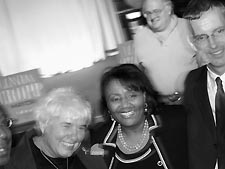 |
MW: As mayor, what issue do you think would be at the forefront for the GLBT community?
CROPP: Well, I know what is an important issue as I talk to people in the community, and that’s gay marriage. We have a very unique problem in the District of Columbia because of our relationship with Congress. That’s an important issue. We have to continue to try to make sure that we can make our own decisions here in the District of Columbia without congressional intervention. But the reality is that I think [marriage] is an issue that would set back a whole lot of things if [Congress] really got involved in it.
MW: It’s been argued that the district’s gay community should push for marriage to make a political point with the likely backlash from Congress. What are your thoughts on that?
CROPP: I don’t think that it’s advantageous to provoke an argument from Congress, particularly this Congress, because I don’t think folks can win on that one. It’s called biting off your nose to spite your face. And I think you could get a recalcitrant Congress to be even worse, to go back on other things. I just recently had to go up on the Hill and take on Congress over [the city’s] domestic partnership. I’m still fighting on needle exchange. There are just certain things where Congress would like to be able to use the district as an example for their own jurisdictions and the message they want to send. I don’t know if you want to give people a stick to hit you in the head with.
So you push the envelope and you keep moving forward, but Article I, Section 8 of the Constitution puts Congress in charge of the District of Columbia, unfortunately. And I will continue to fight so that we in the District will have the right to make our own decisions as to what we want to do about a myriad of things.
MW: Outside of any battles with Congress, how do you feel personally about marriage for gays and lesbians?
CROPP: I have been on record for a long time that I am very much in favor of civil unions. I have attended them. I have many friends who have joined in partnership together and they have committed their lives to each other and I’m very much in favor of that.
MW: Do you see civil unions as distinct from marriage or as equivalent to marriage?
CROPP: I think it is equivalent to marriage to a great extent. I think one of the differences is with regard to the church probably — that is a huge piece of it.
MW: A lot of anti-gay groups oppose civil unions and domestic partnership as well as marriage, because they view it as either a stepping-stone to marriage, or an equivalent to marriage. If you’re creating equivalence with civil unions, and people who oppose gay marriage are against it because it is an equivalent, shouldn’t we just be fighting for marriage in the first place?
CROPP: I don’t know. I have to think about that a little more. But as I said, I was on the forefront of fighting for domestic partnership and voted for it here in the District of Columbia when it wasn’t popular to do that.
MW: Given the controversy over domestic partnerships, are civil unions even politically possible within the district at this point?
CROPP: I’m going to tell you, we have a different Congress right now. I think everyone in the community has a real concern about our current Congress and what those issues will do to the District of Columbia. And certain individuals are about to launch their political careers from Congress, so it would be very easy for them to use the district as their platform.
MW: Looking back over the past year or so in D.C., with Rev. Willie Wilson and the controversy over his sermon, obviously there are still some segments of the D.C. community that aren’t completely accepting of gays and lesbians. Is that a result of religion or homophobia?
CROPP: It’s a combination of religion, homophobia and ignorance. That’s all prejudice is anyway, no matter what form it takes. People talk about the United States being the big melting pot. I don’t think it is and it probably won’t be, at least not for centuries. I look at the United States as being a big salad where you have all these things that are different. You look at me and you see somebody different — I’m different from you. I look at you, you’re different. What we really have to get as a people, as a community, is acceptance of the difference and appreciation for the difference. If you look at a salad — and I’m one of those who likes the salad with everything in it — you see the lettuce and the tomatoes and the olives and the onions. Each has its own uniqueness and its own part that’s special, but it makes it all good by putting them together.
Maybe we try too hard to say we’re all the same when we aren’t. To be accepting of the differences that we all bring to the table, that’s what we have to do in the city. And as mayor that’s what I hope to be able to do. Actually, I see part of the problem that’s developing in the city as not as much racial, not as much sexual orientation, but as an economic division that’s growing.
MW: Is that including gentrification of neighborhoods?
CROPP: Yes, that’s a concern for people. But I look at it a little differently. I don’t have a huge problem in neighborhoods gentrifying as long as you don’t push other folks out. I think it’s big enough for everybody. I want us to have diversity in income, I want to have mixed communities, and I want people with money because they help to pay for the services for those who don’t have money. You’ve got to bring it all in and help to make it work together.
MW: That’s an interesting topic for gays and lesbians because we tend to get hit with the gentrification stereotype — the gay guys and lesbians moving into your neighborhood and being a harbinger of change. I’ve certainly seen gentrification opponents specifically mention them.
CROPP: I always say that the tent’s big enough for everybody and what I want is mix. I always talk about diversity because, quite frankly, we’ve been able to turn this city around, and I played a major role in turning this city around from where we were bankrupt, where we had a $500 million deficit, where we were at junk bond status.
Now we’re talking about putting money in for affordable housing, we’re putting services back for the homeless, we’re talking about providing more health care. And you know how we did it? We did it because we had other individuals with income coming into the city. Our tax base expanded and that’s how we can help. You cannot be against gentrification and then say you’re going to provide all these services. That’s an oxymoron.
MW: How do you find a balance, though? One of the problems is that once a neighborhood starts gentrifying, you say you don’t want people to be pushed out but how do you even control that? You live in Crestwood — how do you move people into Crestwood who aren’t able to afford Crestwood?
CROPP: I don’t think they’re going to move into Crestwood. I’ve been living in my house for 32 years. I couldn’t move into Crestwood right now, because I couldn’t afford Crestwood if I had to buy my house now.
But you do it by having a strong policy. People are shocked when I tell them that Montgomery County and Fairfax County, two of the richest counties in this country, have had an affordable housing policy for decades. Right over here in my conference room, for the past year and a half, I’ve had the non-profits and affordable housing advocates meeting with the developer community so that we could figure out how can we increase the affordable housing in this city. [Councilmember] Jim Graham and I have introduced legislation so that anytime the city gets rid of land for residential purposes, you have a set-aside for affordable housing. And for the developers, you say: You want to put a building here? This building is zoned for four stories — we’re going to let you put six stories on it but you have to put affordable housing in it. So you mix it up and you have to give incentives. You can’t just tell developers ”I want you to do it” — if they aren’t going to make a profit they’ll just stop building housing and build office buildings. That’s just the reality of it. They don’t love the people in the district enough to lose money on building stuff, so you have to give incentives for that to happen.

Cropp at 2005 Capital Pride Parade
MW: What’s your feeling about the relocation of those businesses that are going to be displaced by the new baseball stadium? How far should the city go to try to get that done?
CROPP: I co-introduced legislation with Jim Graham so that the businesses can move into another area. I encouraged and implored and somewhat demanded that the city administrator look for another location so that we can move our businesses. Here’s the problem: Whether it’s a gay businesses or straight businesses, nobody wants any club near their house. That’s the problem that I think we are facing. So we are looking in appropriate areas where we can keep it away from residential property. We have to look for certain kinds of special zoning and I’m willing to work on that.
MW: Last year, Whitman-Walker Clinic and a number of other HIV/AIDS agencies were having problems with reimbursement and such by the city’s office for HIV/AIDS, and some came near closing. Is the city and the office for HIV/AIDS fulfilling their goals or responsibilities in terms of HIV/AIDS?
CROPP: No. When you see HIV/AIDS growing at the rate that it’s growing in the District of Columbia, I don’t think we can say that it’s fulfilling its mission or its goals. I think in the white, male gay community there has been some success in getting it under control and perhaps it’s because it was hit in that community so hard early on. I lost a lot of friends…. [Pauses] I lost a lot of friends with that. Thankfully, it got under control in that community. But it’s growing in other communities where whatever lessons we learned in that community are not going through.
I talked a while ago to our faith-based community because I thought it was just awful that people were not dealing with this issue. You’ve got to talk about the issues, that’s the only way you’re going to get a handle on trying to control it, to prevent it. Fortunately, now there is medication. It’s extremely costly, and I was part of that fight, too, trying to bring the cost down. But when you look at that happening, when you see it growing among black females at the rate it’s growing, in the senior citizen population at the rate it’s growing — no, the office is not working as well as it should be. And I’m not just going to blame the office.
MW: Is it a bureaucratic problem?
CROPP: I think it’s a combination of a whole lot of things. When you see a lot of constant change in the leadership, you’re creating the problem. It’s like the school system: In the past nine years we’ve had five different superintendents of schools. If you bring in five different CEOs in any business during a nine-year period, that business is going down the tubes. It’s the same thing with the HIV/AIDS office. You’ve got to have some stability. You have to have some continuity of programs, of ideas, of processes to handle things.
MW: Do you think the city is understanding of the needs of transgender people?
CROPP: I think there’s ignorance there. I just don’t think people are aware or understand. As a city, we’re still fighting with our emergency medical services and fire department and police department in this area. We still have a way to go with our work force, let alone talking about the average citizen who is not part of the government.
MW: When was the first time you interacted with someone who was transgender? Was it political or was it personal?
CROPP: Political. It was after I was elected and I saw a transgender person, who I did not even realize at first was transgender.
|
MW: Was that a different process for you than for learning about gays and lesbians?
CROPP: For me, it was ignorance. I can be ignorant too. [Laughs.] It’s something that’s different, but that’s when it comes back to what I said earlier, tolerance. And acceptance. My first real experience was with an individual who kept changing back and forth. That let you know what agony they were going through in just trying to deal with it. When I first met him, he was a female and I thought he was a female. Later he was functioning as a male. There was a change back and forth, several times — I don’t mean like in a month, I mean in years. But it’s like anything else: If you haven’t had experience you try to figure it out. You deal with acceptance and tolerance. I just hate to see people having to struggle with trying to be who they are.
MW: When I got here today, you talked a lot about the renovation of the Wilson Building. Do you see the building as sort of emblematic of how things have been going in D.C.?
CROPP: No question about it. There is a sense of pride for me for this building, maybe because it was my first real task and challenge when I became Chair, to keep this building in the hands of district citizens and fixing it up. It was almost the first thing on my plate, and it was accomplished. And when I look at this city, and I look at this building and I see the change that has happened, that it did a 180-degree turnaround, there’s a sense of pride. That’s the feeling I’m getting from folks in this city, too. And that’s part of why I’m running for mayor. When I think of what we’ve done to turn this city around, there’s no way — no way — that I’m going to let this city slide back. So I’m running for mayor to keep it moving forward because I know what it took to get us where we are now. And I want it to go to the next level.
Support Metro Weekly’s Journalism
These are challenging times for news organizations. And yet it’s crucial we stay active and provide vital resources and information to both our local readers and the world. So won’t you please take a moment and consider supporting Metro Weekly with a membership? For as little as $5 a month, you can help ensure Metro Weekly magazine and MetroWeekly.com remain free, viable resources as we provide the best, most diverse, culturally-resonant LGBTQ coverage in both the D.C. region and around the world. Memberships come with exclusive perks and discounts, your own personal digital delivery of each week’s magazine (and an archive), access to our Member's Lounge when it launches this fall, and exclusive members-only items like Metro Weekly Membership Mugs and Tote Bags! Check out all our membership levels here and please join us today!




